The Indian Economy (Hindi, 11th Edition)
₹599.00 Original price was: ₹599.00.₹499.00Current price is: ₹499.00.
Sanjiv Verma Sir was not just an educator—he was a mentor, a guide, and a source of inspiration to thousands of Civil Services aspirants across the country. An alumnus of the esteemed Delhi School of Economics, he dedicated himself to teaching at some of the most reputed Civil Services coaching institutes in Delhi, Hyderabad, Bengaluru, and beyond.
This book was born out of his classroom sessions—crafted with clarity, structured with purpose, and driven by his deep commitment to making economics accessible and relevant for Civil Services Examination aspirants. His ability to distill complex economic concepts into simple, digestible ideas earned him respect and admiration across the student community.
Although his untimely and tragic passing left a deep void, his legacy continues to live on through this book. It stands not only as a testament to his knowledge but also to his passion for teaching and his belief in every aspirant’s potential.
Today, this book has been comprehensively revised and updated by Pavneet Singh, a respected educator and mentor at Tmentors UPSC—an online platform delivering high-quality, affordable courses for the UPSC-CSE. Known for his clarity and command over complex subjects, Pavneet Sir has consciously preserved the original pedagogical spirit envisioned by Sanjiv Verma Sir.
At the same time, the book has been thoughtfully realigned to meet the evolving demands of the examination. It now includes updated content reflecting current economic trends, recent government initiatives, and changing exam patterns—making it as relevant for today’s aspirants as it was when it was first written.
This edition is both a heartfelt tribute to Sanjiv Verma Sir’s enduring legacy and a reliable companion for aspirants navigating the dynamic landscape of the Civil Services Examination.
Additional information
| Dimensions | 17.14 × 1.68 × 24.13 cm |
|---|
Book information
Related products
Bhartiya Samaaj Evam Samajik Nyay for UPSC
About the book:
The first part of this book, "Indian Society and Social Justice," focuses on Indian society, while the second part is dedicated to social justice. The first part on Indian society is divided into 14 chapters, and the second part on social justice is classified into 11 chapters. Each chapter includes model questions along with questions from previous years' Civil Services Main Examination. Additionally, the book provides a trend analysis of questions related to Indian society and social justice asked in the Civil Services Main Examination.
An appendix based on fundamental principles related to various aspects of Indian society helps students better understand core concepts. This book sheds special light on the foundation and characteristics of Indian society, the factors influencing it, and the changes observed in the context of Indian society. From the beginning, the concepts of Vasudhaiva Kutumbakam (the world is one family) and Sarve Bhavantu Sukhinah (may all be happy) have held special significance in Indian society. In view of this, special emphasis has been placed on social justice and its related aspects and components.
The author has made an effort to include, as far as possible, all aspects that are directly or indirectly related to society and social justice.
Bhartiya Samaaj Evam Samajik Nyay for UPSC
About the book:
The first part of this book, "Indian Society and Social Justice," focuses on Indian society, while the second part is dedicated to social justice. The first part on Indian society is divided into 14 chapters, and the second part on social justice is classified into 11 chapters. Each chapter includes model questions along with questions from previous years' Civil Services Main Examination. Additionally, the book provides a trend analysis of questions related to Indian society and social justice asked in the Civil Services Main Examination.
An appendix based on fundamental principles related to various aspects of Indian society helps students better understand core concepts. This book sheds special light on the foundation and characteristics of Indian society, the factors influencing it, and the changes observed in the context of Indian society. From the beginning, the concepts of Vasudhaiva Kutumbakam (the world is one family) and Sarve Bhavantu Sukhinah (may all be happy) have held special significance in Indian society. In view of this, special emphasis has been placed on social justice and its related aspects and components.
The author has made an effort to include, as far as possible, all aspects that are directly or indirectly related to society and social justice.
The Principles for Ethics I Integrity I Aptitude
About the book:
Piyush is guiding students for UPSC preparation for many years. This book, ""The Principles for Ethics, Integrity and Aptitude"" is designed to fulfill all the requirements for the paper on Ethics, Integrity and Aptitude in all the competitive examinations, especially the GS Paper IV of the UPSC Civil Service Examination. As a future bureaucrat, you are not only expected to live by certain principles but also required to develop the insights where you could approach any problem from multiple possibilities and dimensions. Therefore, this Book is going to help you in developing such required perspectives that happen to lie outside the ambit of conventional way of thinking.Book Features:
- It offers insights and strategies to help candidates navigate complex ethical dilemmas and challenges.
- By delving into principles of ethics, integrity, and aptitude, the book equips aspirants with the necessary tools to excel in the examination and in their future roles.
- It encourages critical thinking and fosters a deep understanding of ethical principles and decision-making.
- Through practical examples and exercises, the book facilitates the development of a well-rounded approach to problem-solving.
- Overall, "The Principles for Ethics, Integrity and Aptitude" serves as a comprehensive and invaluable resource for aspirants preparing for competitive examinations, guiding them towards success in both the examination and their future careers.
The Principles for Ethics I Integrity I Aptitude
About the book:
Piyush is guiding students for UPSC preparation for many years. This book, ""The Principles for Ethics, Integrity and Aptitude"" is designed to fulfill all the requirements for the paper on Ethics, Integrity and Aptitude in all the competitive examinations, especially the GS Paper IV of the UPSC Civil Service Examination. As a future bureaucrat, you are not only expected to live by certain principles but also required to develop the insights where you could approach any problem from multiple possibilities and dimensions. Therefore, this Book is going to help you in developing such required perspectives that happen to lie outside the ambit of conventional way of thinking.Book Features:
- It offers insights and strategies to help candidates navigate complex ethical dilemmas and challenges.
- By delving into principles of ethics, integrity, and aptitude, the book equips aspirants with the necessary tools to excel in the examination and in their future roles.
- It encourages critical thinking and fosters a deep understanding of ethical principles and decision-making.
- Through practical examples and exercises, the book facilitates the development of a well-rounded approach to problem-solving.
- Overall, "The Principles for Ethics, Integrity and Aptitude" serves as a comprehensive and invaluable resource for aspirants preparing for competitive examinations, guiding them towards success in both the examination and their future careers.
Samanya Hindi Avam Nibandh
About the book:
A compilation of essays related to political, social, economic, and other topics.
Inclusion of all aspects of Hindi grammar.
Detailed discussion on the practice of summarization.
Samanya Hindi Avam Nibandh
About the book:
A compilation of essays related to political, social, economic, and other topics.
Inclusion of all aspects of Hindi grammar.
Detailed discussion on the practice of summarization.
Law Optional For UPSC Civil Services Main Examination I
About the book:
Law Optional for Civil Services Examination focuses on the core concepts and principles of law to ensure a solid understanding of the subject. It adopts a systematic approach and logical sequencing of the material to facilitate effective learning and retention. All relevant updates and recent legal developments are incorporated to ensure aspirants are well-versed in the latest legal principles and precedents. Also, the book provides references to notable cases to enrich the understanding of practical applications.Book Features:
- Exclusively designed for Civil Services Examination.
- Focus on concepts and clarity of principles of law.
- Concise, reliable, and well-structured resource.
- Emphasis on current legal developments with detailed references to leading cases.
Law Optional For UPSC Civil Services Main Examination I
About the book:
Law Optional for Civil Services Examination focuses on the core concepts and principles of law to ensure a solid understanding of the subject. It adopts a systematic approach and logical sequencing of the material to facilitate effective learning and retention. All relevant updates and recent legal developments are incorporated to ensure aspirants are well-versed in the latest legal principles and precedents. Also, the book provides references to notable cases to enrich the understanding of practical applications.Book Features:
- Exclusively designed for Civil Services Examination.
- Focus on concepts and clarity of principles of law.
- Concise, reliable, and well-structured resource.
- Emphasis on current legal developments with detailed references to leading cases.
Secret History of Selection of Supreme Court Judges
About the book:
The central argument of this book is that despite all established formal constitutional requirements, there are multiple unwritten criteria that are used for appointing judges to the Supreme Court. The book examines the debates surrounding the Indian judicial system and anecdotal evidences and deeply analyses the Indian political developments that resulted in the present 'collegium system' of appointing judges to the Supreme Court of India and brings to the fore the secret and unwritten criteria that have determined the selection of judges to the highest court of law in this country. The National Judicial Appointments Commission's (NJAC) judgment on the appointment of judges to the Supreme Court has been the subject of a deeply polarized debate in the public sphere and academia. This book subsequently analyses the NJAC judgment and provides a rich context to it, in terms of philosophical, comparative, and constitutional issues that underpin it. The book examines the secret constitutional principles behind selecting judges and their application in the NJAC judgment; and comparatively looks at the judicial appointments process in the United Kingdom, South Africa, and Pakistan, enquiring into what makes a good judge and an effective appointments process. The book is a deep dive into the constitutional concepts of judicial independence and separation of powers as discussed in the NJAC judgment.About The Author:
Pavneet Singh is an educational consultant and is associated with training aspirants for the Civil Services Examination. He is also the author of many best-selling titles for the Civil Services Examination.Secret History of Selection of Supreme Court Judges
About the book:
The central argument of this book is that despite all established formal constitutional requirements, there are multiple unwritten criteria that are used for appointing judges to the Supreme Court. The book examines the debates surrounding the Indian judicial system and anecdotal evidences and deeply analyses the Indian political developments that resulted in the present 'collegium system' of appointing judges to the Supreme Court of India and brings to the fore the secret and unwritten criteria that have determined the selection of judges to the highest court of law in this country. The National Judicial Appointments Commission's (NJAC) judgment on the appointment of judges to the Supreme Court has been the subject of a deeply polarized debate in the public sphere and academia. This book subsequently analyses the NJAC judgment and provides a rich context to it, in terms of philosophical, comparative, and constitutional issues that underpin it. The book examines the secret constitutional principles behind selecting judges and their application in the NJAC judgment; and comparatively looks at the judicial appointments process in the United Kingdom, South Africa, and Pakistan, enquiring into what makes a good judge and an effective appointments process. The book is a deep dive into the constitutional concepts of judicial independence and separation of powers as discussed in the NJAC judgment.About The Author:
Pavneet Singh is an educational consultant and is associated with training aspirants for the Civil Services Examination. He is also the author of many best-selling titles for the Civil Services Examination.Fundamentals of Ethics by Pavneet Singh | Best for GS Paper – IV, Latest Edition
About the book:
Fundamentals of Ethics is a must-read for the GS paper 4. This book enables the students to build a sound theoretical framework of the subject as it provides a succinct introduction to all the terms mentioned in the syllabus. Unlike other books, this does not feed students with pre-digested answers. Instead, it helps in merging personal experience with conceptual understanding, which in turn enhances their answer-writing skills and bridges the gap between theory and reality.Exam Details:
The Civil Services Examination (CSE) is a nationwide competitive examination in India conducted by the Union Public Service Commission for recruitment to various Civil Services of the Government of India, including the Indian Administrative Service (IAS), Indian Foreign Service (IFS), and Indian Police Service (IPS). Also simply referred to as the UPSC examination, it is conducted in three phases - a preliminary examination consisting of two objective-type papers (General Studies Paper I and General Studies Paper II also popularly known as Civil Service Aptitude Test or CSAT), and a main examination consisting of nine papers of conventional (essay) type, in which two papers are qualifying and only marks of seven are counted followed by a personality test (interview).Book Features:
- It emphasizes the importance of critical thinking and application of ethical principles in real-life scenarios.
- Through its succinct introduction to essential terms, the book lays the groundwork for a comprehensive study of ethics.
- It encourages students to engage actively with the subject matter, promoting a deeper level of learning and understanding.
- With its focus on merging personal experience with conceptual understanding, the book offers a unique and effective approach to ethics education.
- Overall, "Fundamentals of Ethics" is a must-read for GS paper 4 aspirants seeking to develop a strong foundation in ethical theory and application.
Fundamentals of Ethics by Pavneet Singh | Best for GS Paper – IV, Latest Edition
About the book:
Fundamentals of Ethics is a must-read for the GS paper 4. This book enables the students to build a sound theoretical framework of the subject as it provides a succinct introduction to all the terms mentioned in the syllabus. Unlike other books, this does not feed students with pre-digested answers. Instead, it helps in merging personal experience with conceptual understanding, which in turn enhances their answer-writing skills and bridges the gap between theory and reality.Exam Details:
The Civil Services Examination (CSE) is a nationwide competitive examination in India conducted by the Union Public Service Commission for recruitment to various Civil Services of the Government of India, including the Indian Administrative Service (IAS), Indian Foreign Service (IFS), and Indian Police Service (IPS). Also simply referred to as the UPSC examination, it is conducted in three phases - a preliminary examination consisting of two objective-type papers (General Studies Paper I and General Studies Paper II also popularly known as Civil Service Aptitude Test or CSAT), and a main examination consisting of nine papers of conventional (essay) type, in which two papers are qualifying and only marks of seven are counted followed by a personality test (interview).Book Features:
- It emphasizes the importance of critical thinking and application of ethical principles in real-life scenarios.
- Through its succinct introduction to essential terms, the book lays the groundwork for a comprehensive study of ethics.
- It encourages students to engage actively with the subject matter, promoting a deeper level of learning and understanding.
- With its focus on merging personal experience with conceptual understanding, the book offers a unique and effective approach to ethics education.
- Overall, "Fundamentals of Ethics" is a must-read for GS paper 4 aspirants seeking to develop a strong foundation in ethical theory and application.
ETHICS Made Easy A Unique Approach to GS Paper-IV
About The Author:
Ashok Kumar, Director General of Police (DGP)

Ashok Kumar, an accomplished IPS officer and a graduate of IIT Delhi, is currently the Director General of Police, Uttarakhand. Kumar's commendable contributions have earned him the UN Medal for his dedicated service in strife-torn Kosovo, the Indian Police Medal, and the President's Police Medal for his exceptional service. Additionally, he is a respected author known for insightful works such as Human in Khaki and Challenges to the Internal Security of India. His latest book, Cyber Encounters, is already a bestseller in both English and Hindi editions and has kickstarted a country-wide debate on cybercrimes.
Dr. Rajesh Mohan, IPS Officer

Dr. Rajesh Mohan, an all-India 102 rank-holder in the UPSC CSE, 2020, is an IPS officer of the Haryana cadre. He has an impressive track record in competitive exams such as CMS 2015, HCS exams, and CET and AIPMT. He has previously worked as a Medical Officer at IOFHS. He was selected for the Uttar Pradesh Civil Services exam in 2020.
About the book:
Ethics Made Easy is a unique book to help candidates understand and master GS Paper 4 of the Civil Services Examination. It focuses on the analysis of Previous Years’ Questions and frames content that aligns with sources commonly used by the examiners, like journals and government data, in setting questions in the Ethics paper. Mr. Kumar’s (1989 batch) practical experience in the field over the years and Mr. Mohan’s (2021 batch) deep understanding of the latest trend in the exam blends to make Ethics Made Easy the ultimate comprehensive solution for excelling in the Ethics paper.
Mr. Kumar’s (1989 batch) practical experience in the field over the years and Mr. Mohan’s (2021 batch) deep understanding of the latest trend in the exam blends to make Ethics Made Easy the ultimate comprehensive solution for excelling in the Ethics paper.
Key Features:
-
Content developed through scientific Sources.
-
Tracing exercise based on the analysis of PYQs.
-
Handwritten model answers to case studies by selected civil servants.
-
Model answers to PYQs and Case Studies from 2020 to 2022 in the book.
-
All other model answers and case solutions are available in the book.
-
Unique approach to resolving ethical dilemmas through Ethical Triangulations, the Go/No-Go Model.
-
Framework for approaching case studies.
-
Focus on ensuring each term mentioned in the syllabus is sufficiently covered and explained.
ETHICS Made Easy A Unique Approach to GS Paper-IV
About The Author:
Ashok Kumar, Director General of Police (DGP)

Ashok Kumar, an accomplished IPS officer and a graduate of IIT Delhi, is currently the Director General of Police, Uttarakhand. Kumar's commendable contributions have earned him the UN Medal for his dedicated service in strife-torn Kosovo, the Indian Police Medal, and the President's Police Medal for his exceptional service. Additionally, he is a respected author known for insightful works such as Human in Khaki and Challenges to the Internal Security of India. His latest book, Cyber Encounters, is already a bestseller in both English and Hindi editions and has kickstarted a country-wide debate on cybercrimes.
Dr. Rajesh Mohan, IPS Officer

Dr. Rajesh Mohan, an all-India 102 rank-holder in the UPSC CSE, 2020, is an IPS officer of the Haryana cadre. He has an impressive track record in competitive exams such as CMS 2015, HCS exams, and CET and AIPMT. He has previously worked as a Medical Officer at IOFHS. He was selected for the Uttar Pradesh Civil Services exam in 2020.
About the book:
Ethics Made Easy is a unique book to help candidates understand and master GS Paper 4 of the Civil Services Examination. It focuses on the analysis of Previous Years’ Questions and frames content that aligns with sources commonly used by the examiners, like journals and government data, in setting questions in the Ethics paper. Mr. Kumar’s (1989 batch) practical experience in the field over the years and Mr. Mohan’s (2021 batch) deep understanding of the latest trend in the exam blends to make Ethics Made Easy the ultimate comprehensive solution for excelling in the Ethics paper.
Mr. Kumar’s (1989 batch) practical experience in the field over the years and Mr. Mohan’s (2021 batch) deep understanding of the latest trend in the exam blends to make Ethics Made Easy the ultimate comprehensive solution for excelling in the Ethics paper.
Key Features:
-
Content developed through scientific Sources.
-
Tracing exercise based on the analysis of PYQs.
-
Handwritten model answers to case studies by selected civil servants.
-
Model answers to PYQs and Case Studies from 2020 to 2022 in the book.
-
All other model answers and case solutions are available in the book.
-
Unique approach to resolving ethical dilemmas through Ethical Triangulations, the Go/No-Go Model.
-
Framework for approaching case studies.
-
Focus on ensuring each term mentioned in the syllabus is sufficiently covered and explained.
Indian Economy Digest
About the author:
- Bijendra Kumar -

He stands tall as a luminary in the realm of UPSC CSE mentoring, boasting an illustrious career spanning over 23 years. His academic journey is adorned with stellar achievements, culminating in a post-graduate degree in Economics from the prestigious Delhi School of Economics, Delhi University, followed by an MBA in Finance. This formidable educational background serves as the bedrock upon which his pedagogical prowess rests.
As a senior faculty member affiliated with various coaching institutes, Bijendra Kumar brings a wealth of experience to the table, enriching the lives of countless aspirants with his erudition and guidance. His teaching methodology is a harmonious blend of simplicity and depth, rendering the intricate concepts of economics accessible to all.
About the book:
- Indian Economy Digest -
Master economic theories effortlessly with our simplified guide, designed to demystify complex concepts for easy comprehension. Explore relatable examples that connect with Indian contexts seamlessly, enhancing your understanding. Stay informed and updated with concise summaries of crucial government schemes, providing valuable insights into current affairs. Delve deeper into economic discourse with insights from reputable Economic forums and organisations, enriching your knowledge base. Prepare effectively for exams with chapter-wise Previous Year Questions (PYQs), accompanied by detailed answers and explanations, ensuring thorough examination readiness. Strengthen your skills with a diverse range of practice questions tailored to each topic, empowering you to excel in your studies. Elevate your economic prowess and achieve academic success with our comprehensive resource.
About the exam:
Indian Economy book for upsc. The Civil Services Examination (CSE) is a nationwide competitive examination in India conducted by the Union Public Service Commission for recruitment of various Civil Servants of the Government of India, including IAS, IFS, IPS and IRS. It is conducted in three phases: A preliminary examination consisting of two objective-type papers (General Studies Paper- I and General Studies Paper- II also popularly known as Civil Service Aptitude Test), and Main Examination consisting of four General Studies Papers, a Compulsory Essay Paper and Optional Subject Paper I & II and Qualifying Paper on Indian Languages and English, followed by Interview Test.
Indian Economy Digest
About the author:
- Bijendra Kumar -

He stands tall as a luminary in the realm of UPSC CSE mentoring, boasting an illustrious career spanning over 23 years. His academic journey is adorned with stellar achievements, culminating in a post-graduate degree in Economics from the prestigious Delhi School of Economics, Delhi University, followed by an MBA in Finance. This formidable educational background serves as the bedrock upon which his pedagogical prowess rests.
As a senior faculty member affiliated with various coaching institutes, Bijendra Kumar brings a wealth of experience to the table, enriching the lives of countless aspirants with his erudition and guidance. His teaching methodology is a harmonious blend of simplicity and depth, rendering the intricate concepts of economics accessible to all.
About the book:
- Indian Economy Digest -
Master economic theories effortlessly with our simplified guide, designed to demystify complex concepts for easy comprehension. Explore relatable examples that connect with Indian contexts seamlessly, enhancing your understanding. Stay informed and updated with concise summaries of crucial government schemes, providing valuable insights into current affairs. Delve deeper into economic discourse with insights from reputable Economic forums and organisations, enriching your knowledge base. Prepare effectively for exams with chapter-wise Previous Year Questions (PYQs), accompanied by detailed answers and explanations, ensuring thorough examination readiness. Strengthen your skills with a diverse range of practice questions tailored to each topic, empowering you to excel in your studies. Elevate your economic prowess and achieve academic success with our comprehensive resource.
About the exam:
Indian Economy book for upsc. The Civil Services Examination (CSE) is a nationwide competitive examination in India conducted by the Union Public Service Commission for recruitment of various Civil Servants of the Government of India, including IAS, IFS, IPS and IRS. It is conducted in three phases: A preliminary examination consisting of two objective-type papers (General Studies Paper- I and General Studies Paper- II also popularly known as Civil Service Aptitude Test), and Main Examination consisting of four General Studies Papers, a Compulsory Essay Paper and Optional Subject Paper I & II and Qualifying Paper on Indian Languages and English, followed by Interview Test.
Disaster Management for Civil Services Examinations I UPSC Civil Services I IAS preparation
About the book:
The public policy approach to disaster management studies the responses that the state evolves when managing disasters. These state responses are important because they have implications on the development strategy that the state would adopt after the disasters have occurred and also how communities would mould their responses in future such occurrences. The book analyses the comprehensive and dedicated public policy-based disaster responses in India and how these strategies have enabled communities and governments to evolve resilient disaster management practices. The public policy perspective traces its origin from geography, uses geographical inputs, and then analyses the geospatial profile of India to examine the vulnerabilities. The book then places the distinct public policy responses to each disaster and articulates the governmental perspective on disaster management through a thorough and deep contextual analysis of the policy frameworks involved. The number of questions on Disaster Management are increasing every year in the UPSC Civil Services Main Examination even when the subject continues to receive step brotherly treatment. The problem is compounded when the subject is seen as a veritable arm of 'Geography', even when the UPSC has placed the subject under GS Mains Paper -lll. This book provides a through treatment to the subject by re-visiting the intellectual discourse through the prism of public policy and provides the readers with theoretical underlings, ideas and interdisciplinary perspectives to tackle the UPSC Main Exam questions.- Comprehensive coverage of Disaster Management
- Public Policy approach
- Interdisciplinary perspective
- Relevance to contemporary issues
Book Features:
- Disaster Management is an interdisciplinary field drawing on inputs from various disciplines, including pure sciences and management.
- Despite its broad scope, there's a tendency in UPSC coaching classes and publications to associate disaster management primarily with Geography and Environment.
- However, it's essential to recognize disaster management's deeper connection with management principles and public policy.
- The public policy approach to disaster management examines the responses formulated by the state in managing disasters, which shape future development strategies and community responses.
- Overall, the book offers a comprehensive exploration of disaster management from a public policy perspective, illuminating the strategies and frameworks shaping responses to disasters in India.
About The Author:
Pavneet Singh is a teacher for Civil Services Examination, and presently is associated with teaching in Unacademy. He has authored various bestselling books for Civil Services Examination.Disaster Management for Civil Services Examinations I UPSC Civil Services I IAS preparation
About the book:
The public policy approach to disaster management studies the responses that the state evolves when managing disasters. These state responses are important because they have implications on the development strategy that the state would adopt after the disasters have occurred and also how communities would mould their responses in future such occurrences. The book analyses the comprehensive and dedicated public policy-based disaster responses in India and how these strategies have enabled communities and governments to evolve resilient disaster management practices. The public policy perspective traces its origin from geography, uses geographical inputs, and then analyses the geospatial profile of India to examine the vulnerabilities. The book then places the distinct public policy responses to each disaster and articulates the governmental perspective on disaster management through a thorough and deep contextual analysis of the policy frameworks involved. The number of questions on Disaster Management are increasing every year in the UPSC Civil Services Main Examination even when the subject continues to receive step brotherly treatment. The problem is compounded when the subject is seen as a veritable arm of 'Geography', even when the UPSC has placed the subject under GS Mains Paper -lll. This book provides a through treatment to the subject by re-visiting the intellectual discourse through the prism of public policy and provides the readers with theoretical underlings, ideas and interdisciplinary perspectives to tackle the UPSC Main Exam questions.- Comprehensive coverage of Disaster Management
- Public Policy approach
- Interdisciplinary perspective
- Relevance to contemporary issues
Book Features:
- Disaster Management is an interdisciplinary field drawing on inputs from various disciplines, including pure sciences and management.
- Despite its broad scope, there's a tendency in UPSC coaching classes and publications to associate disaster management primarily with Geography and Environment.
- However, it's essential to recognize disaster management's deeper connection with management principles and public policy.
- The public policy approach to disaster management examines the responses formulated by the state in managing disasters, which shape future development strategies and community responses.
- Overall, the book offers a comprehensive exploration of disaster management from a public policy perspective, illuminating the strategies and frameworks shaping responses to disasters in India.


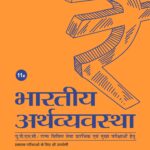
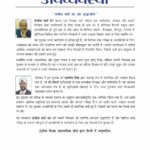
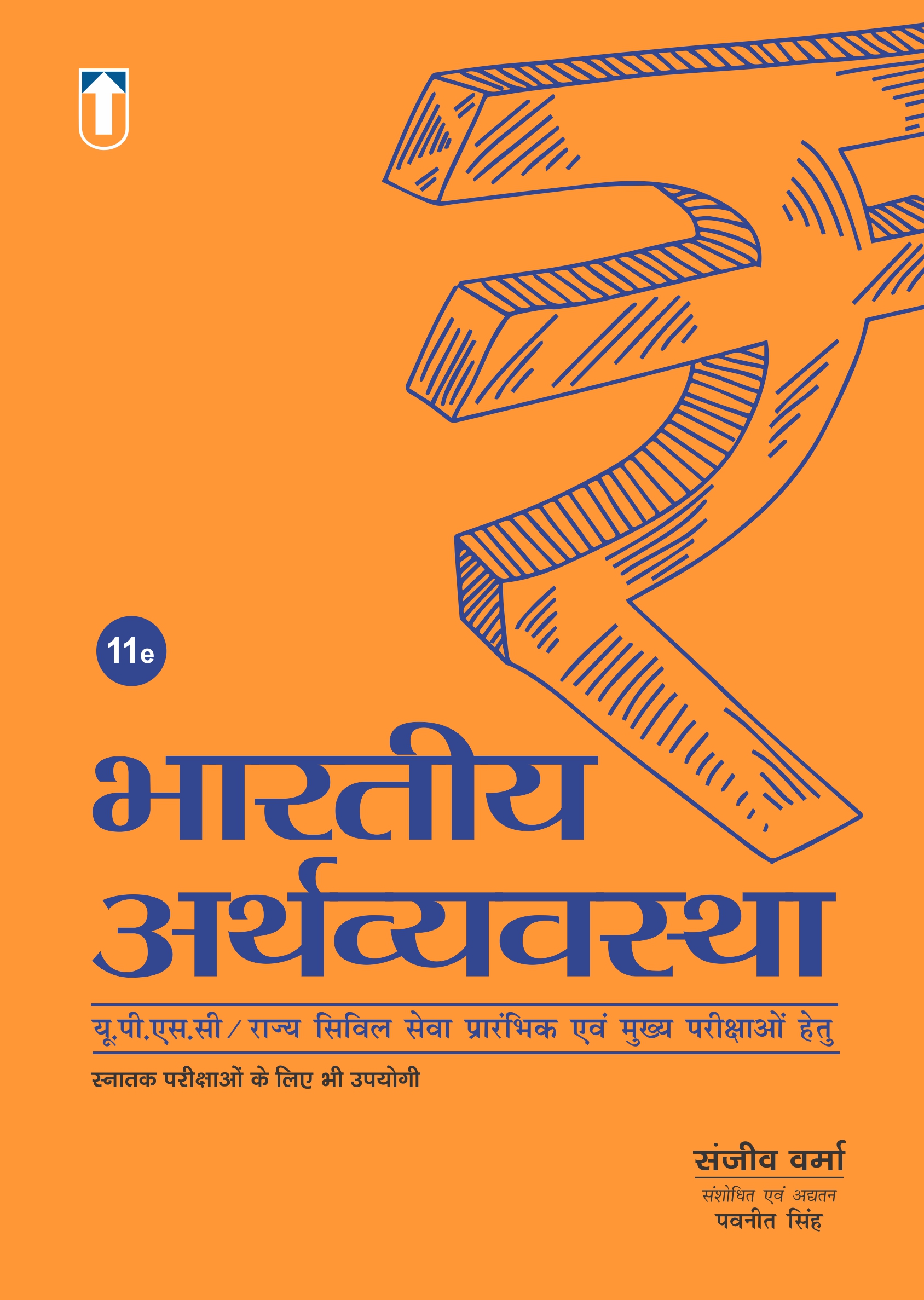
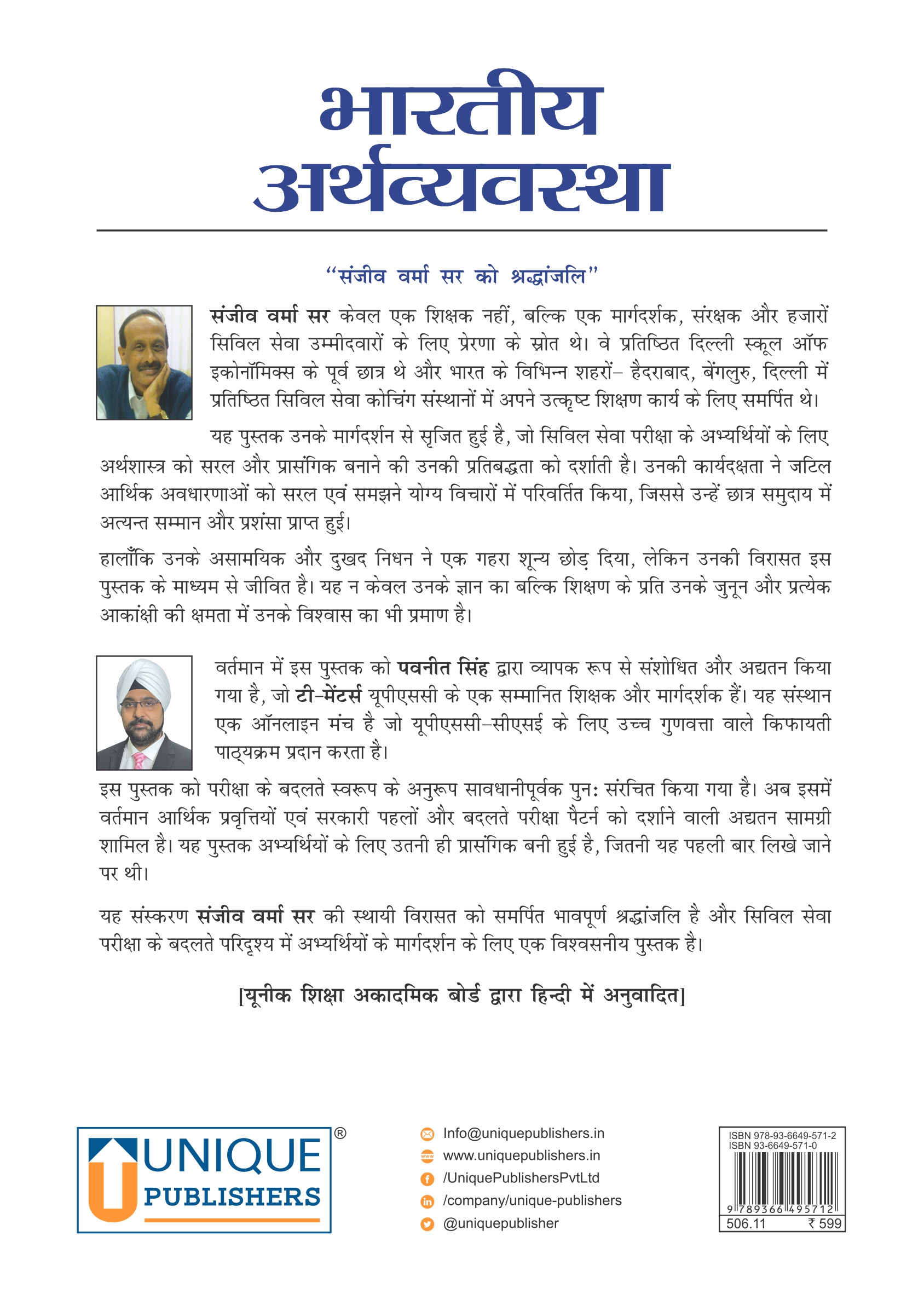

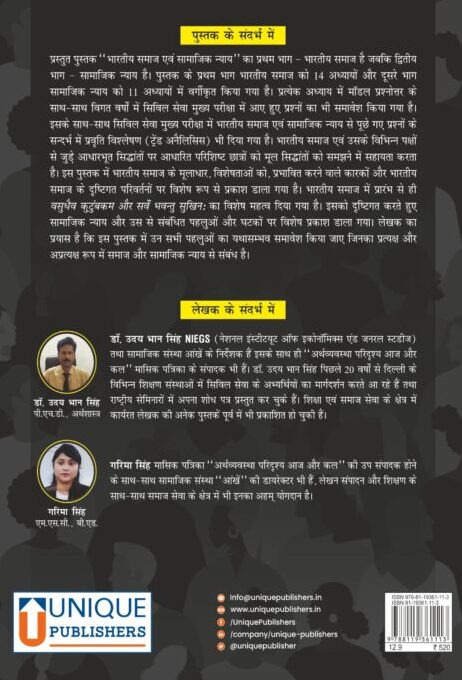


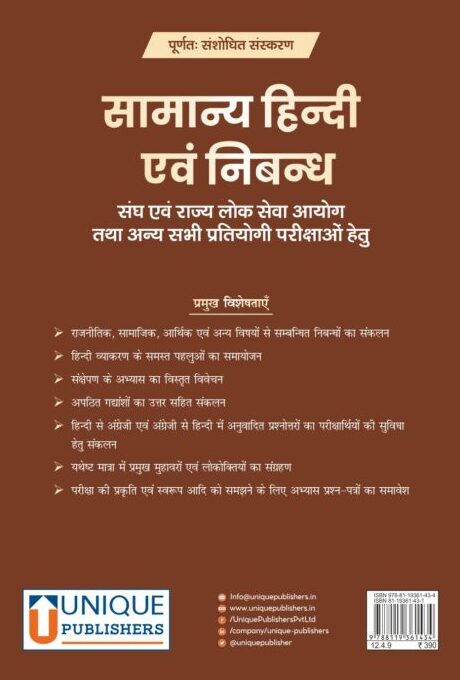
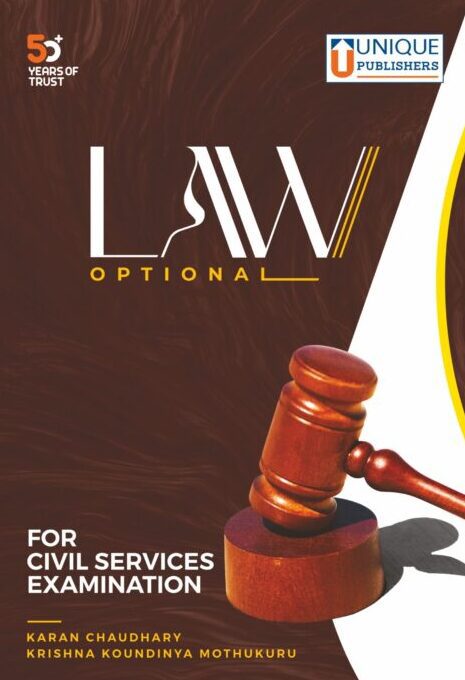


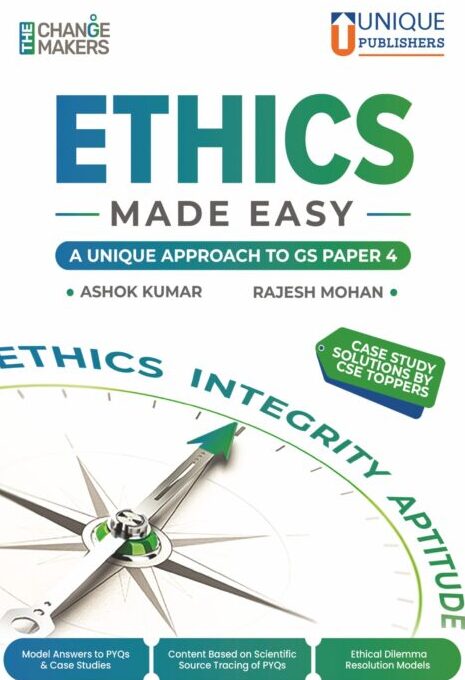
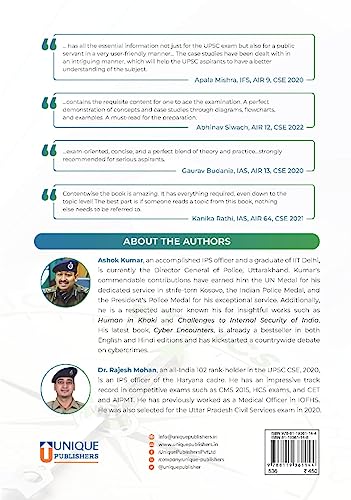
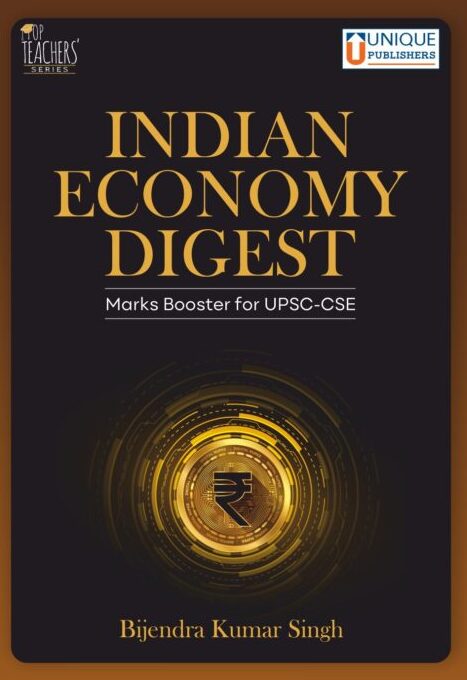
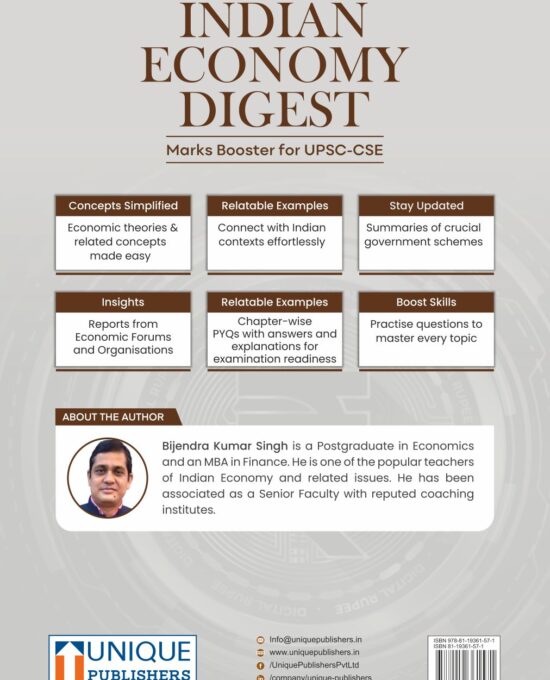

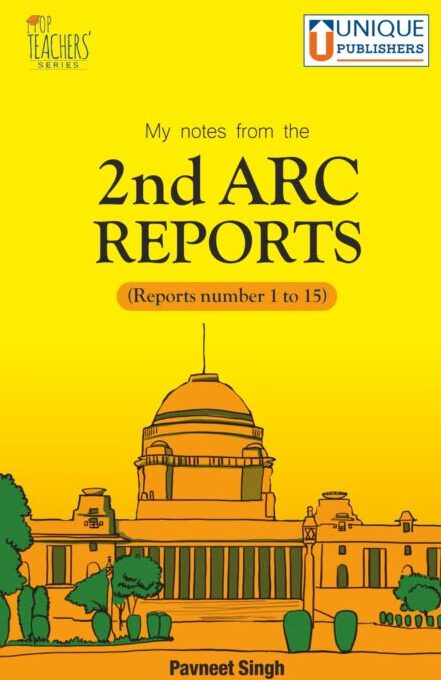
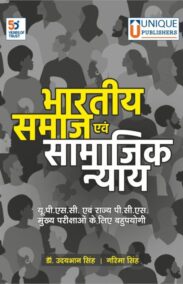
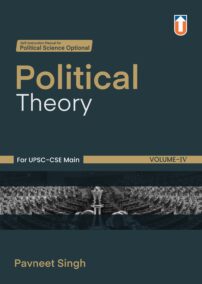
Reviews
There are no reviews yet.